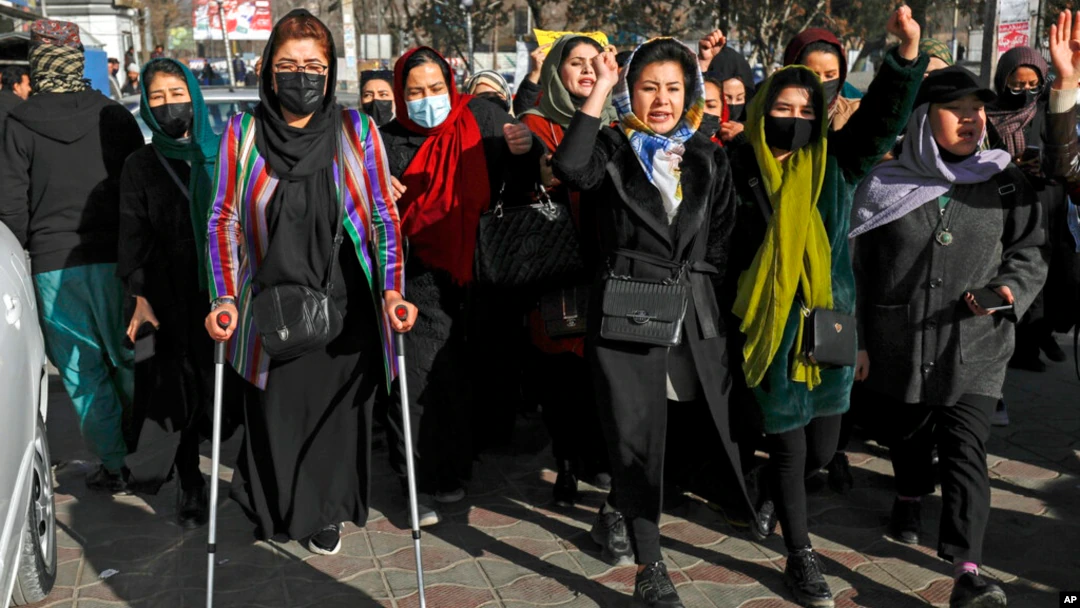Defying the Taliban’s latest ban on university education for women, dozens of Afghan women’s rights activists and girl students Thursday staged a protest in Kabul, Takhar and Nangarhar provinces, demanding that women be allowed access to education and employment.
“Rights for everyone or no one,” the women wearing Islamic hijabs chanted as they marched through the streets in the western part of the capital, Kabul, home to the country’s largest universities.
Eyewitnesses said the protests in Kabul were quickly shut down by Taliban security officials and that at least five women and a couple of male protesters were arrested. Sources connected to women activists confirmed two of those arrested were released.
One of the female protesters, who asked that her name not be used for fear of Taliban retaliation, told VOA, “The Taliban forces beat us up and arrested some of our female and male protesters and took them away. They scattered us apart. However, we will not let it go. We will fight for our rights.”
‘They kicked us out’
The Taliban’s armed security guards on Wednesday allowed male students to attend exams but stopped female students from entering their classrooms in different universities.
“We went to the university to give our exam; our male classmates were able to get in the hall, but we were not allowed by the armed Taliban forces. They kicked us out of the university with violence and cruelty, as if we had committed a huge crime. We have four exams left. What is going to be our future?” said one female student from Nangarhar University who asked not to be identified for safety reasons.
“I had studied and prepared for my exam until very late that night. As soon as I woke up and saw the news about the ban, my dreams shattered. I started crying. Why are we treated as criminals? We have no respect and no values for these people,” said Bahar Ahmadzai, a student at Kabul Medical University.
The ban was announced Tuesday, a day before the universities’ final exams.
Following broad condemnation of the move, the Taliban’s higher education minister, Neda Mohammad Nadeem, defended the decision in a post on Twitter.
“The Nation is angry with me because of the closure of girls’ education, while this is the order of the Messenger of Allah,” the tweet said. “Islam does not allow women to do prostitution in the name of education. A woman is like a piece of land owned by a man, and she is obligated to be at his service, not perusing education.”
In the eastern city of Nangarhar, some male university students also walked out of their exams in protest against the Taliban’s decision to ban female students from higher education.
One male student, who also declined to provide his name, said, “We did not attend the exam and we will not until our female classmates are allowed to take exams, too.”
On Wednesday after female students were not allowed to take part in the exams, several male professors from various universities in multiple provinces resigned in protest.
‘Dark day’
Obaidullah Wardak, assistant professor at Kabul University, said, “I and some of my colleagues resigned in protest against this dark day. We will not return to the university unless the decision is revoked by the Taliban.”
Afghan writer and human rights activist Shafiqa Khpalwak called the ban on girls’ education a crime against humanity. She asked the international community and Islamic countries to step forward and help the Afghan women in this fight against extremism.
“This catastrophe does not only concern the rise of women but threatens the whole existence of our country,” she said. “The so called ‘international community’ is also responsible for the crisis and now they cannot look away from us, they cannot walk away from the mess they have created. We need them to come up with practical and pragmatic solutions that will eventually bring results for us.”
“Afghan women are alone in this fight against radicalism. They need help!” she added.
Lida Afghan, a Danish-Afghan artist whose art highlights social problems and women’s rights, said it is time for the world to stand with the Afghan women.
“I was supposed to focus on my exams today and then I got the news that Afghan women are banned from going to the university,” Lida said. “I thought: It could have been any of us if our parents hadn’t fled the country. In these tough times the whole world should be standing up for the Afghan women, knowing it could have been one of us.”
The Taliban have so far shut girls’ secondary schools; banned women from public parks, gyms and baths; imposed mandatory hijab “covering faces”; and imposed executions and harsh public punishments such as flogging.
Several countries including the United States and the U.N.’s mission in Afghanistan asked the Taliban leadership to “immediately” revoke the decision.
Credit: This story originated in VOA’s Deewa Service.







Leave a Reply